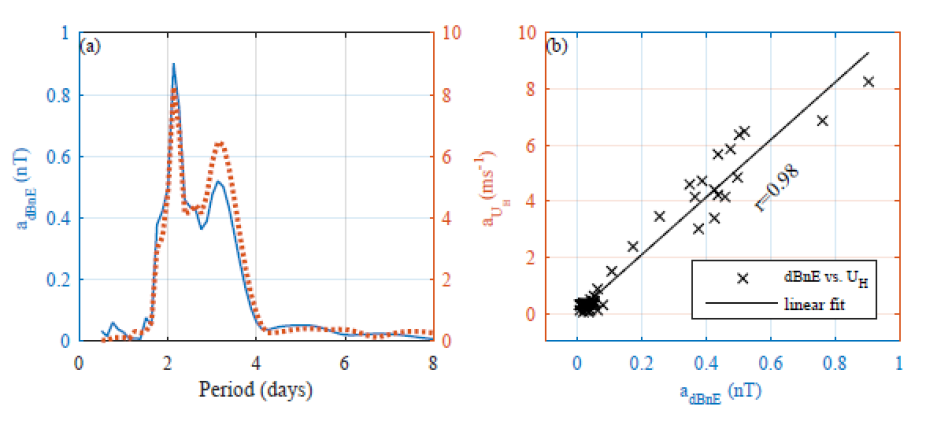Publication Name: JGR Space Physics; First HAO Author: Astrid Maute; Authors as they are listed in article: Jerey M. Forbes, Maosheng He, Astrid Maute, and Xiaoli Zhang
Kelvin waves are large scale wave that is important for Earth’s atmosphere. The Ultra-Fast Kelvin waves (UFKW) are a subset of the Kelvin waves that can propagate to the mesosphere and lower thermosphere (MLT) ~100km and above due to their high zonal phase speeds. In the lower thermosphere the longest lasting UFKW events (~20 days) are eastward propagating with a zonal wave number of 1. The UFKW contribute to the F-region variability through the ionospheric electrodynamo but also through F-region in situ winds and field-aligned drift.

Amplitude spectra of ground magnetic northward magnetic perturbation between +/-2 deg dBnE (solid) and zonal wind at Hall conductivity peak ~107km between +/-20deg (dotted). (b) Scatter plot of the data in (a). The results are based on the difference between a TIEGCM with and without UFKW (2-7 days with eastward propagating with zonal wavenumber 1).
In this study the ground magnetic perturbations signal due to ionospheric currents driven by the UFKW with periods between 2-4 days and eastward propagating with zonal wavenumber 1 are quantified. The result clarifies that it should be possible to extract signals from UFKW events in the ground magnetometer data if the enough (4-6) equally spaced stations around the globe are used. For the analysis we used the TIEGCM driven at the lower boundary by perturbations informed via lower atmospheric reanalysis data. The northward ground magnetic signal associated with the UFKW is around +/-5nT at low latitudes. The results indicate that the ground magnetic field measurements can potentially be used as a proxy for UFKW eastward winds in the E-region.
link to paper: Ultrafast Kelvin Wave Variations in the Surface Magnetic Field